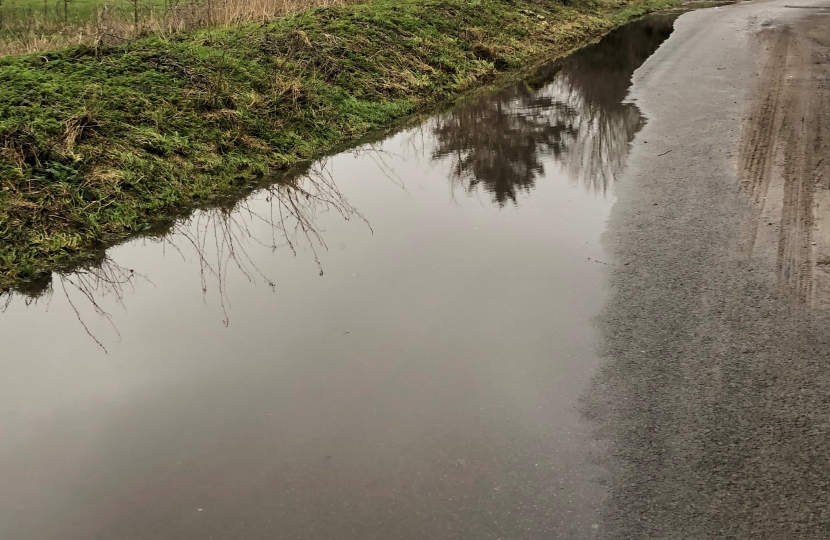
James has been raising concerns with Anglian Water, the Environment Agency, Norfolk County Council, and others over the flooding impact across villages in North West Norfolk and pressing for action to help constituents.
Today he has received the below update from Anglian Water which he has been asked to share with constituents which sets out the scale of the challenge across the region, how to report an emergency, and potential additional mitigation steps.
Anglian Water update
"As you will be aware following our recent meeting, we are dealing with large scale flooding across our region, following excessive and persistent rainfall since Christmas. Last month our region saw over 140% of the average rainfall we would usually expect. This followed a particularly wet three months at the end of 2020 (140% Long Term Average rainfall). In fact we’ve seen the wettest December and January for 100 years.
Following such persistent rainfall, any further rainfall, even small volumes that are falling on already saturated ground, are causing significant challenges as groundwater levels are extremely high and infiltrating into our sewer network. This is what is causing the flooding we are seeing, rather than a specific problem with our network. Sewers are simply not designed to carry this volume of water we’ve seen, or take excess flows from overflowing rivers and streams in some areas. Even once the rain stops, water levels will take time to peak before they begin to subside and the situation starts to improve.
We’re receiving very high numbers of customer contact which means we need to prioritise our work. At some locations we are tankering water away from our pumping stations to reduce the floodwater and help keep customers’ facilities working. We have doubled our fleet of tankers, now using more than 100 so we can help customers whose homes are flooding or where there is a risk to the environment, and because we need to manage this critical work first, it means we may not be able to attend reports of external flooding for some time, so are asking customers to please bear with us.
We’re also working with the Environment Agency in various locations, to agree temporary permits which allow us to pump flood water away into nearby rivers and streams. These are called Local Enforcement Position statements (LEPs) and are only granted if they meet certain strict environmental criteria. Once we have these pumps in place it means we can redeploy tankers to where they are needed most critically, in areas where LEPs are not an option. We only have a finite number of tankers and we need to balance all customer and environmental risks.
The use of these LEPs is seen as a very last resort where we have no other options. We will only consider requesting a LEP where the sewage is so dilute the chemical levels (measured as ammonia) are extremely low and the water discharged is visually clear so we won’t harm the environment. Also, we will only over pump volumes that our pumping stations cannot cope with and nothing more. If approved, we will monitor water quality on a daily basis and report samples back to the Environment Agency in writing every day. As soon as our pumping stations are able to keep up with flows we will stop over pumping.
We would urge our customers to sign up to the Environment Agency’s Flood Warning service for the latest flood alerts in their area, and advise them that local councils should be contacted for problems with road drains, keeping gullies clear and issuing sandbags if they are needed. However, customers should still contact us if they feel they have an emergency, such as a loss of toilet facilities or blocked sewer, and customers can report issues by calling us on 03457 145 145. Our phone lines are extremely busy at the moment, so customers can use our self-serve online form as well.
This on-going wet weather incident has been in place since Christmas affecting many villages and communities across our region. Our teams have been working tirelessly to help as many customers as we can, but we simply cannot get to everyone as quickly as we want to, which is why prioritising those in most need is so important. We absolutely acknowledge and understand the frustration of those who we’re unable to get to, but would share with them the urgency of some situations which need our help and support first, those with internal flooding, loss of toilet facilities, the most vulnerable in society and places where there is a serious environmental risk.
We would very much appreciate your help and support at this time as we continue to work through this challenging situation and welcome any assistance you can provide by sharing this message with your constituents. We will, of course, continue to investigate and respond to any queries or concerns you have, either directly or on behalf of constituents so do please pass on anything you need help with."

